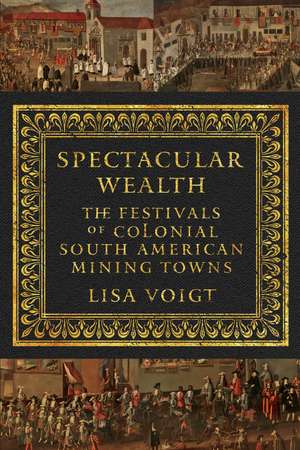Spectacular Wealth: The Festivals of Colonial South American Mining Towns
Autor Lisa Voigten Limba Engleză Hardback – 13 dec 2016
Tracing the multiple meanings and messages of civic festivals and religious feast days alike, Spectacular Wealth highlights the conflicting agendas at work in the organization, performance, and publication of festivals. Celebrants and writers in mining boomtowns presented themselves as far more than tributaries yielding mineral wealth to the Spanish and Portuguese empires, using festivals to redefine their reputations and to celebrate their cultural, spiritual, and intellectual wealth.
Preț: 530.22 lei
Preț vechi: 688.59 lei
-23% Nou
Puncte Express: 795
Preț estimativ în valută:
101.47€ • 110.18$ • 85.23£
101.47€ • 110.18$ • 85.23£
Carte tipărită la comandă
Livrare economică 23 aprilie-07 mai
Preluare comenzi: 021 569.72.76
Specificații
ISBN-13: 9781477310502
ISBN-10: 1477310509
Pagini: 237
Dimensiuni: 152 x 229 x 23 mm
Greutate: 0.45 kg
Editura: University of Texas Press
Colecția University of Texas Press
ISBN-10: 1477310509
Pagini: 237
Dimensiuni: 152 x 229 x 23 mm
Greutate: 0.45 kg
Editura: University of Texas Press
Colecția University of Texas Press
Notă biografică
Lisa Voigt is an associate professor of Spanish and Portuguese at the Ohio State University in Columbus. She is the author of Writing Captivity in the Early Modern Atlantic: Circulations of Knowledge and Authority in the Iberian and English Imperial Worlds, which received the Katherine Singer Kovacs Prize from the Modern Language Association.
Cuprins
- Introduction
- Part 1: Texts
- Chapter 1. In Praise of Follies: Creole Patriotism in the Festivals of Arzáns’s Historia de la Villa Imperial de Potosí
- Chapter 2. Celebrating Minas Gerais in Triunfo Eucharistico and Aureo Throno Episcopal
- Part 2: Celebrants
- Chapter 3. Festive Natives in Potosí, from Audience to Performance
- Chapter 4. “Nos Pretos como no Prelo”: Afro-Brazilians in Festivals, from Performance to Print
- Conclusion: Spectacular Tributes
- Notes
- Works Cited
- Index
Recenzii
"In this carefully researched and thoughtfully crafted book, Lisa Voigt makes a compelling case against José Antonio Maravall's argument that civic festivals were among the key practices used by church and crown to direct the culture of the Hispanic world during the Baroque period."
"[A] richly researched, methodologically original, and lucidly-written study of eighteenth-century Baroque festival culture in South America."
"Spectacular Wealth is an exceptionally well-documented and beautifully written book. In sum: a model of critical clarity."
"Spectacular Wealth challenges us to analyze the multiplicity of the interventions and interpretations enacted in these festivals and to transcend the borders of any one empire on our scholarship."
"A well-constructed and complex narrative...Voigt has succeeded in bringing together first-hand eighteenth-century festival accounts with secondary sources and theories on diverse aspects of culture in colonial South America into a seamless narrative."
"An important contribution to the discussion of race, religion, and wealth in colonial Latin America seen through festive cultural celebrations…Voigt does an outstanding job of truly integrating colonial Brazil in the examination of Spanish American colonial texts by looking at the important interconnections that exist among both."
Descriere
Drawing on archival research, this illuminating study shows how residents of all ethnicities in three colonial boomtowns used festivals to redefine wealth and present themselves as more than subjects of European power.
